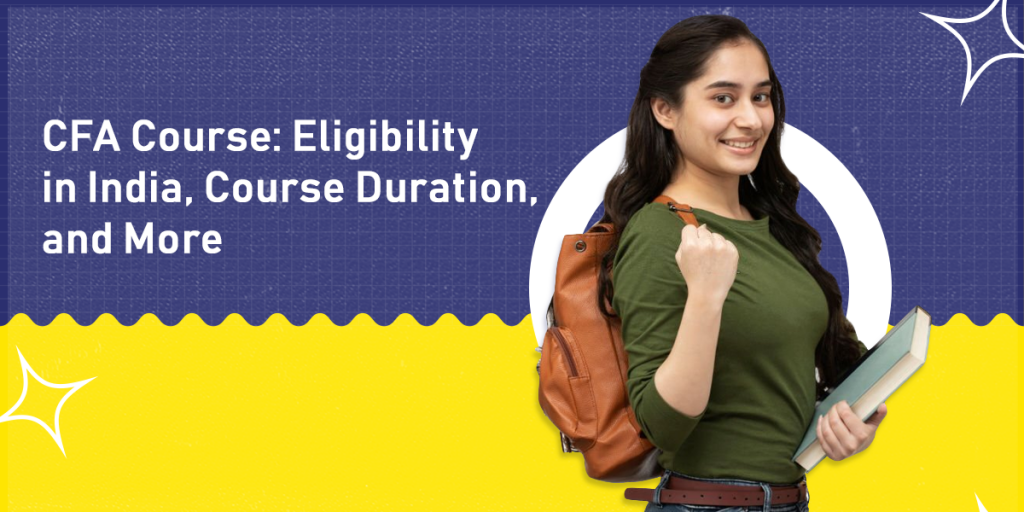CFA Course: Eligibility in India, Course Duration, and More

If you’re looking for a degree in accounting to enhance your career path, earning the CFA is the best choice. With all the hype about CFA, it can be confusing to find out which program is best for your career. We can help you with that.
Here’s everything you need to know about the CFA, from the syllabus and course fee to guaranteed placement and more.
What is CFA:
CFA stands for Chartered Financial Analyst. CFA is one of the most sought-after financial designations in India as well as globally. CFA should be your go-to financial certification course if you are someone interested in the field of investment management.
The CFA course will help you master and around investment analysis, portfolio management, investment management, financial analysis, and many more.
The CFA course has a total of three levels, Level I, Level II, and Level III. These three levels not only test your skills and subject knowledge but also your consistency and patience levels.
Candidates who clear their CFA exam will open doors to infinite career and job opportunities. Let’s get to know more details about the CFA course and the benefits of doing this course.
CFA Course Details:
CFA Course Duration:

The CFA course minimum duration is two years. Most candidates take an average of 3-4 years to clear the three levels.
CFA Syllabus with weightage:

The CFA course syllabus is mainly focused on basic concepts of finances and investment disciplines. Candidates need to clear one level to move to the next. Candidates who clear their CFA certification will have deep all round knowledge of financial accounting, investment analysis, derivatives, stock market, investment depth, etc.
CFA Syllabus:
The CFA course has three levels:
- Level I
- Level II
- Level III
| CFA Subjects | Weight Given in CFA Level 1 | Weight Given in CFA Level 2 | Weight Given in CFA Level 3 |
| Ethical and Professional Standards | 15-20 | 10-15 | 10-15 |
| Quantitative Methods | 8-12 | 5-10 | N/A |
| Economics | 8-12 | 5-10 | 5-10 |
| Financial Statement Analysis | 13-17 | 10-15 | N/A |
| Corporate Issuers | 8-12 | 5-10 | N/A |
| Equity Investments | 10-12 | 10-15 | 10-15 |
| Fixed Income | 10-12 | 10-15 | 15-20 |
| Derivatives | 5-8 | 5-10 | 5-10 |
| Alternative Investments | 5-8 | 5-10 | 5-10 |
| Portfolio Management and Wealth Planning | 5-8 | 10-15 | 35-40 |
CFA Eligibility:

In order to take the CFA exam, the candidates have to meet a set of requirements to register for the examination.
- Candidates have to complete their bachelor’s degree or any equivalent degree from any recognized college or university in any stream.
- A minimum work experience of 4000 hours over a duration of three years is a must for registration for the Level I exam. The required work experience can also be a combination of 4000 hours or the equivalent of higher education.
- The required work experience need not be just in the fields of investment management and analysis. It can be in any other field but it is important that the candidate have top-notch management and communication skills.
- Candidates must have an international passport to sit for the exam.
- Candidates must have fluency in the English language as the syllabus and exams will be conducted in English language only.
- Candidates who are in their last year of bachelor’s can also register for the exam. But it should be seen that their graduation is completed by the time of their Level II registration.
- If you are someone doing your own business or working as an intern or in an article ship, your experience there can be counted under the minimum work requirement.
- A professional compliance statement is also a requirement for registration for the CFA exam.
CFA Course Fees:

The course fee for CFA enrolment is USD350 which converts to around INR 27,000 in India. CFA is an expensive course when compared to other financial certifications.
The fee paid for the CFA course will vary based on the time you register for the exam. The earlier you register, the less your enrollment fee will be.
Here is more info regarding the CFA course fees:
| Registration Type | Course Fee in USD |
| Early Registration | 900 |
| Standard Registration | 1200 |
The rescheduling fee if you want to change your exam date will be USD 250.
CFA Subjects:
As we already discussed that the CFA exam is in three levels, Level I, Level II, and Level III, the questions asked in the exam mainly revolve around the core curriculum topics. All three levels of the CFA exam usually are concentrated on similar topics.
With each level of the exam, the difficulty of the questions in the test increases. So here is the list of the subjects at all the levels along with their brief description.
| CFA Core Curriculum Topics | Description |
| Ethical and Professional Standards | It introduces the candidates to ethical behaviour and the need for professionalism in the investment market. |
| Quantitative Methods | Deals with Descriptive Statistics, Probability Theory, and Investment decision-making aspects. |
| Economics | This subject deals with the supply and demand analysis of individuals and firms, along with microeconomic concepts and market structure. |
| Financial Statement Analysis | It offers a thorough explanation of the financial reports along with their standards and procedures. |
| Corporate Issuers | It deals with corporate governance and stakeholder management. |
| Equity Investments | It is related to the study of the security markets, indexes, and equity investment areas of the economy. |
| Fixed Income | Helps in Learning about fixed-income securities, factors risking it, measures to maintain them, and their measurement techniques |
| Derivatives | It helps in understanding the basics of derivatives and the framework of the derivative market. |
| Alternative Investment | This involves the concept of hedge funds, private equity, real estate, infrastructure, and others. |
| Portfolio Management and Wealth Planning | This helps with the proper understanding of the fundamentals of portfolio management and wealth planning. |
The weightage of the questions asked in each topic varies from level to level. So make sure you have the proper idea of the weightage allotted to each topic at each level. Here is a summary of the latest weight of topics in Level I, Level II and Level III.
CFA Level I: Subject Wise Weightage:
| CFA Syllabus Level 1 | Weightage |
| Ethical and Professional Standards | 15-20% |
| Quantitative Methods | 8-12% |
| Economics | 8-12% |
| Financial Statement Analysis | 13-17% |
| Corporate Finance | 8-12% |
| Equity Investments | 10-12% |
| Fixed Income | 10-12% |
| Derivatives | 5-8% |
| Alternative Investments | 5-8% |
| Portfolio Management and Wealth Planning | 5-8% |
CFA Level II: Subject Wise Weightage:
| CFA Syllabus Level 2 | Weightage |
| Fixed Income | 10-15% |
| Derivatives | 5-10% |
| Alternative Investments | 5-10% |
| Portfolio Management and Wealth Planning | 10-15% |
| Ethical and Professional Standards | 10-15% |
| Quantitative Methods | 5-10% |
| Economics | 5-10% |
| Financial Statement Analysis | 10-15% |
| Corporate Finance | 5-10% |
| Equity Investments | 10-15% |
CFA Level III: Subject Wise Weightage:
| CFA Syllabus Level 3 | Weightage |
| Ethical and Professional Standards | 10-15% |
| Quantitative Methods | 0% |
| Economics | 5-10% |
| Financial Statement Analysis | 0% |
| Corporate Finance | 0% |
| Equity Investments | 10-15% |
| Derivatives | 5-10% |
| Alternative Investments | 5-10% |
| Fixed Income | 15-20% |
| Portfolio Management and Wealth Planning | 35-40% |
CFA Exam Pattern:
CFA Level I Exam Pattern:
- The complete examination would be divided into 1/2 every term of two hours and 15 minutes.
- There might be ninety MCQ questions for each half.
- The first session would cover subjects that include ethics & professional requirements, quantitative techniques, economics, and financial reporting and analysis.
- the second session includes questions about corporate finance, equity, fixed profits, derivatives, opportunity investments, and portfolio management
- Applicants get an average of ninety seconds to answer a particular question in the level 1 examination.
- In our research and analysis, we observed that most candidates spent an average of 303 hours a year to clear their CFA level 1 exam on the very first attempt.
CFA Level II Exam Pattern:
- The time allotted for the CFA level 2 exam is 4.5 hours.
- With an optional break in between, the exam is split into two halves, each lasting 135 minutes.
- There are 88 multiple-choice questions that are supported with vignettes in total. Consequently, each session would consist of 44 questions.
- 4-6 MCQs would follow each Vignette. For each accurate response, each MCQ is worth 3 points.
- It stresses the use of investing techniques and concepts in context-specific scenarios while concentrating on the valuation of distinct assets.
- The passing rate is 45% on average.
- To pass the level 2 exam, students must put in a total of 328 hours every year, or 27 hours per month.
CFA Level III Exam Pattern:
- The total time required to complete the CFA Level 3 test is 4.5 hours, with each session lasting 2 hours and 15 minutes.
- In the second session, there will be a total of 8–11 vignettes, followed by MCQs. The Level 3 test consists of 44 MCQs in total.
- Additionally, there are essay-style questions with a range of points assigned to them.
- The answers must be typed by the applicants into the text field.
- There will be 3 or more options for the MCQs.
- It requires the applicant to synthesize all the ideas and analytical techniques taught throughout the whole program with an emphasis on successful wealth planning and portfolio management.
- To pass, the applicants must put in around 344 hours every year.
CFA Exam Dates:

CFA Level I Exam Dates:
| Exam Period | Dates |
| February Period | 14–20 February 2023 |
| May Period | 16–22 May 2023 |
| August Period | 22 – 28 August 2023 |
| November Period | 11 – 17 November 2023 |
CFA Level II Exam Dates:
| Exam Period | Dates |
| May Period | 23–27 May 2023 |
| August Period | 29 August – 2 September 2023 |
| November Period | 18 – 22 November 2023 |
CFA Level III Exam Dates:
| Exam Period | Dates |
| February Period | 21–23 February 2023 |
| August Period | 29 August – 5 September 2023 |
CFA Preparation Books:

Though the CFA exam is on the tougher side, with proper preparation nothing is impossible. Proper Planning and strategic preparation is the key to success when it comes to CFA. Study materials and books will be the main source of knowledge as we already know, so selecting the best study material out there will be the best bet for you.
| Book Titles | Authors |
| Investment Banking: Valuation, Leveraged Buyouts, and Mergers & Acquisitions | Pearl and Rosenbaum |
| 2021 CFA Level I | Kaplan Schweser |
| The Cartoon Guide to Statistics | Larry Gonick and Woollcott Smith |
| The Handbook of Fixed Income Securities | Frank J. Fabozzi |
| CFA Level I | Bhupesh Anand |
| Strategic Value Investing: Practical Techniques of Leading Value Investors | Stephen M. Horan, Robert R. Johnson, and Thomas R. Robinson |
| When Genius Failed: The Rise and Fall of Long-Term Capital Management | Roger Lowenstein |
CFA Study Materials:
Each level of the CFA requires applicants to put in around 300-340 hours of study time. Proper notes and study materials should be used in addition to the study hours. Many institutions provide useful study materials at different prices, but few of them genuinely stand out in terms of usefulness.

Let’s examine a few of the well-known websites or periodicals that offer CFA notes for various levels.
Kaplan Schweser:
One of the most reputable Institutions that provide study materials for all three levels of the CFA test is Kaplan Schweser. Both online and print versions of the notes are accessible. For each level, there are two separate packages of the Kaplan CFA notes. The premium package is one, while the essential bundle is another. Additionally, all of their packages include Schweser Pass Protection, which guarantees that the institute would make the package completely free if the applicants fail the exam.
Schweser CFA Level 1:
The Premium package and the Essential package are the two classes that make up the Schweser CFA Level 1 notes. The fundamental bundle costs USD 699 and the premium package USD 999 (INR 74,752). (INR 52,304). The basic study materials, practice tests, and Schweser pass insurance are all included in the fundamental package. The Schweser CFA Level 1 premium package includes study materials, Schweser passes protection, workshops, and on-demand tutoring sessions.
Kaplan Schweser CFA Level 2:
The Level 2 Package is also split into the Premium and Essential packages. The Essential bundle costs USD 699 and the Premium package costs USD 999 (INR 74,752). (INR 52,304). Similar to Level 1, the Kaplan Schweser CFA Level 2 premium package includes study guides with test questions, online workshops, and seminars, and pass protection. Only study materials and Schweser pass protection are provided for the core course.
Kaplan Schweser CFA Level 3:
The CFA Level 3 notes are necessary for passing the CFA course’s final exam. Three packages—premium plus, premium, and essential—comprise the Kaplan Schweser CFA Level 3 study materials. Priced at USD 1499 (INR 112,232) for the Premium Plus package, USD 1099 (INR 82,277) for the Premium Package, and INR 52,304 for the Essential Package (USD 699). The main study materials, test notes, practice problems, tutors on demand, and the chance to plan your exam strategy with professionals are all included in the premium plus package. Study materials, test questions, and professional advice are all included in the premium bundle, whereas the study materials and test questions are the sole items in the essential pack.
CFA Documents Required:
- A valid passport for overseas travel is required for CFA candidates. The number supplied during the online application procedure must coincide with this one. Note to dual citizens: double check that the passport you’ll be bringing matches the one you used to register.
- Your name, birthdate, passport number, expiration date, and country of issuance should all be listed on the passport.
- A current passport is required (i.e. not expired).
- A picture must be included in the passport.
- It must be a document for travel. In other words, anything other than just an ID card or driver’s license that you may use to travel internationally.
- It should go without saying that you must bring your actual passport to the exam, not a copy.
CFA Job Opportunities in India:

With careers in positions like Portfolio Manager, Research Analyst, Risk Manager, Corporate Financial Analyst, and Investment Banking Analyst, Scope of CFA is one of the most well-known courses for finance in India.
The abilities possessed by these professions are in more demand. It is for this reason that organizations like KPMG, PwC, Deloitte, EY, JP Morgan Chase, Bank of America Merrill Lynch, Deutsche Bank, Credit Suisse, Motilal Oswal, and Anand Rathi employ CFAs right out of Level 1.
India is the global center for accounting. The majority of multinational financial corporations operate in India. In a developing nation like India, where the IMF has predicted a growth rate of 10%, the value of a finance degree is enormous.
CFA Salary in India:

A Chartered Financial Analyst can find employment in a variety of jobs after successfully completing the CFA certification program, including business consultant, investment manager, private banker, CFO, and many more. The compensation range for applicants is between INR 8,00,000 and INR 20,00,000.
Let’s talk about the CFA pay in India for the various job categories.
| Job Profile | Salary |
| Chartered Financial Analyst | INR 4,00,000-INR 16,00,000 |
| Business Consultant | INR 989,000 |
| Market Research Analyst | INR 337,000 |
| Investment Manager | INR 13,00,000 |
| Portfolio Manager | INR 10,86,000 |
| Private Bankers | INR 624,000 |
| Risk Manager | INR 998,000 |
| CFO | INR 34.45,992 |
CFA Course Comparison
CFA or MBA: Which course is better?
If you can’t decide between a CFA or an MBA in Finance, you must carefully analyse your possibilities before making your choice. An MBA in Finance from one of the best colleges may position you as a top candidate for businesses in India and overseas, while CFAs can offer you several global chances in the financial markets and investment fields. To ensure that your MBA will have the greatest possible effect on your career, you must ensure that the university you select is one of the top 10 for an MBA in Finance.
CFA vs US CMA: Which Course is better?
Certified Management Accounting (CMA) is for individuals who have a stronger interest in the accounting side of finance, whereas Chartered Financial Analyst (CFA) is an international credential obtained by people who want to work in the investment business & portfolio management. Before choosing between CFA and CMA because they are specialisation degrees in various areas of business, you need to consider your preferences. Continue to be perplexed? Learn more about the distinctions between CFA and US CMA.





